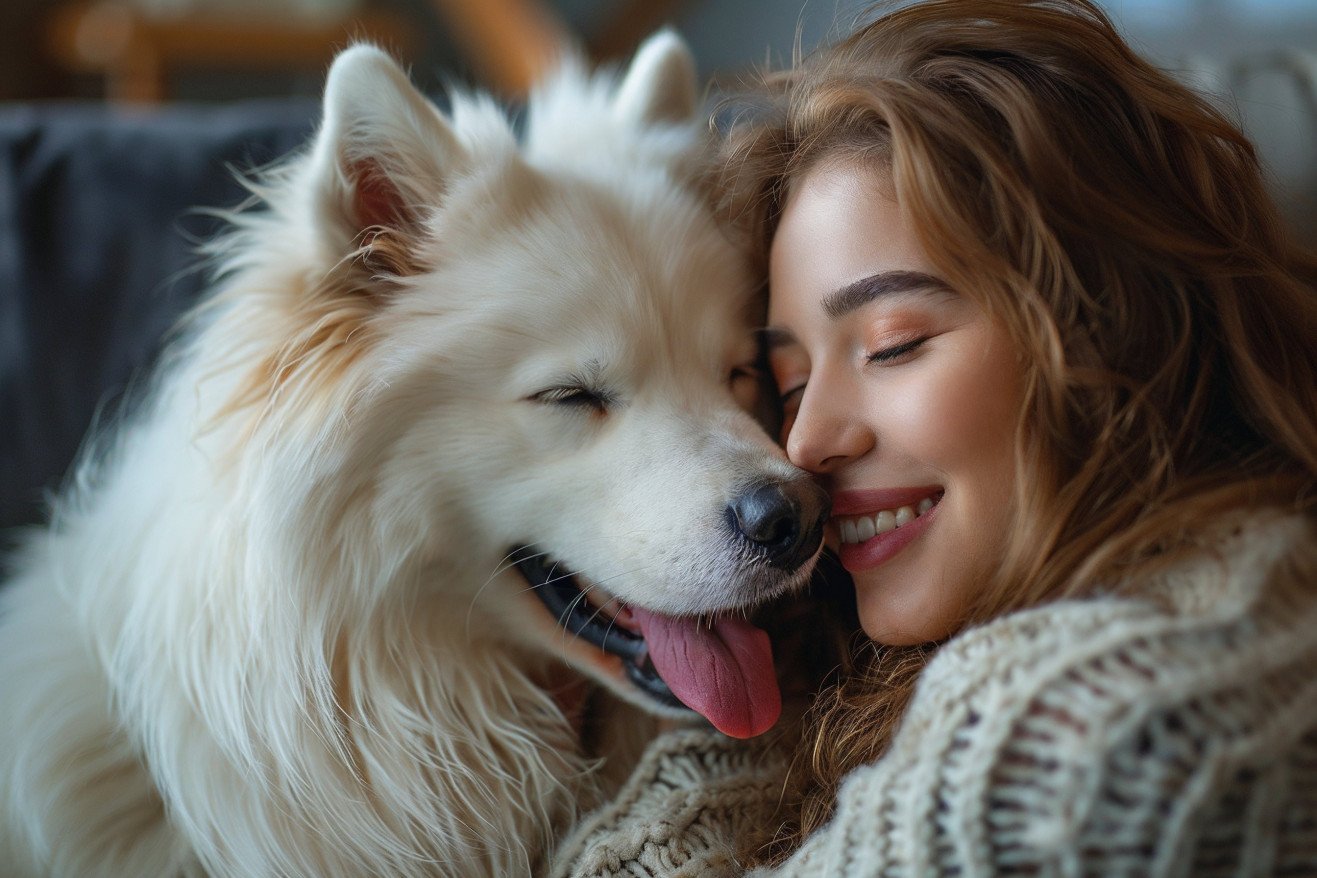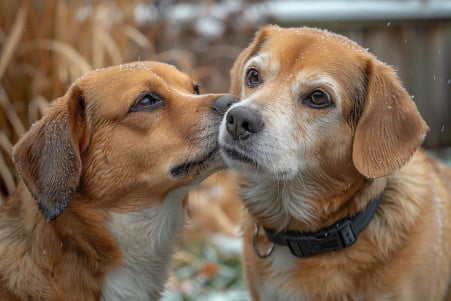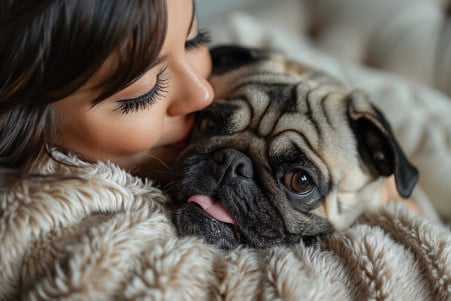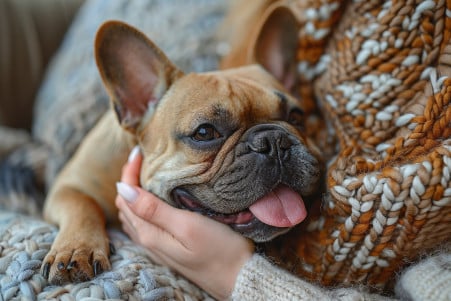Why Does My Dog Lick My Ears? Uncovering Canine Behavior
2 March 2024 • Updated 1 March 2024

While it may be strange or even cute, you may have wondered why your dog licks your ears. Dogs lick human ears for a variety of reasons, including to show their owners they love them, to bond with their humans, and even because they like the taste of earwax.
For dogs, licking ears can be soothing and even instinctual, as it’s a way to groom their pack members. However, if your dog is licking your ears too much, it may be a sign of anxiety or a medical issue, so you may want to talk to your vet.
To better understand why dogs lick human ears, we’ll look at a number of different sources, including research on dog behavior, expert opinions from veterinarians, and even studies on human psychology. By doing this, we hope to uncover the many different reasons dogs lick human ears, which range from social bonding and communication to sensory stimulation and even potential health concerns.
By reviewing this information, we hope to give you a better idea of why your dog may be licking your ears and how you can best respond to their affection.
Why does my dog lick my ears?
What Ear Licking Says About a Dog’s Social World
Ear licking is a social behavior that goes beyond the bounds of playfulness. According to Furtropolis, it is a remnant of dogs’ pack instincts and is used to communicate, show affection, and build social relationships. Puppies often learn to lick from their mothers, who use it as a way to interact with their young, and sometimes transfer this behavior to their human family members.
In the dog world, licking can be a sign of respect and submission. The Billings Animal Family Hospital notes that a dog will often lick the ears of a more dominant member of the pack to show submission. Meanwhile, the Rocklin Ranch Veterinary Hospital explains that dogs that are raised with other animals, including humans, often participate in mutual grooming behaviors like ear licking to help build social relationships.
These behaviors help to soothe and comfort both the licker and the recipient, and they also help to satisfy a dog’s natural curiosity and desire to explore. Licking is a way for dogs to learn about their world and their human family members, and it’s a sensory behavior that is as natural to them as sniffing.
Knowing this information can help dog owners better understand their pets and build stronger relationships with them. It also helps to show just how deeply dogs are trying to show their loyalty and love to their human family members.
The Psychology of Dog-Human Relationships
The emotional connection between dogs and humans goes far beyond the simple affection of a dog licking a person’s ear. However, the bond that dogs form with their human caregivers is similar to the attachment that human parents form with their children and is a sign of a deep psychological relationship that can help explain why dogs lick their owners’ ears.
As the PMC explains, dogs show attachment to their owners by seeking them out for comfort when they’re stressed, and this attachment is similar to the attachment that children show to their parents when they’re upset.
Dogs’ ability to read and respond to human emotions, which allows them to tell the difference between happiness and sadness, as well as between calm and anxiety, is also important in their relationships with their human companions. This sensitivity to their owners’ feelings may impact a dog’s decision to lick their owner’s ears, which could be a way of offering comfort or connection in response to the owner’s emotional state.
The relationship between dogs and their human companions is also reciprocal, with each party taking on the role of caregiver at different times. According to Wikipedia, the oxytocin that’s released when dogs and humans interact not only strengthens the bond between the two but also contributes to the well-being of both.
The way that dogs’ licking their owners’ ears is reinforced by their human companions, whether it’s through a positive response or a treat, is another factor that can explain why dogs do this. This positive reinforcement makes it more likely that dogs will continue to lick their owners’ ears, which in turn deepens the bond between the two and creates a pattern of licking.
This combination of factors demonstrates the depth of the psychological relationship between dogs and humans and the way that dogs use their senses to navigate the world.
Understanding Dogs’ Senses: Smell and Taste and Ear Licking
Dogs’ highly developed sense of smell plays a big role in their licking behavior, including ear licking. A study in PMC on Canine Olfaction explains that dogs have an amazing sense of smell that is a major way they interact with the world. Their sense of smell allows them to detect scents and changes in their environment, including the odors that come from human ears.
Dogs’ taste preferences are also interesting and may drive behaviors like ear licking. A study in PMC explains that dogs have taste preferences, even though their taste receptors are different from humans’. This could explain why they’re attracted to the salty taste of human earwax.
In addition, studies in PMC have shown that dogs can use their sense of smell to detect human emotions. This special talent could lead dogs to lick their owners’ ears to comfort them when they detect that they’re feeling stressed or anxious. It’s likely that dogs’ highly developed senses of taste and smell combine to make licking human ears irresistible, satisfying their curiosity and their desire to help.
Love and Health: What Does Ear Licking Mean?
While a dog’s ear lick may be a sign of affection, it’s also important to consider the health implications. A study published in PMC found that dog saliva can carry several health risks, including the potential for bacterial transmission, such as Capnocytophaga canimorsus, which can lead to dangerous infections, especially in people with compromised immune systems.
While these infections are rare, they can be quite serious, as one case showed when a man was hospitalized after a dog licked his wound.
On the other hand, a study cited by the American Kennel Club suggests that dog saliva may have probiotic effects on human health, potentially impacting the bacteria in our guts. This means that dog licks may have a positive effect on our health in some ways.
To make sure that we’re accepting our dogs’ love while also protecting our health, the CDC and veterinarians alike recommend regular dental care for dogs and discourages letting dogs lick sensitive areas like wounds or the face.
By making sure that we’re practicing good hygiene and paying attention to the health of both pets and their humans, we can enjoy the bonding experience of ear licks while also making sure that we’re protecting ourselves from potential health issues.
How to Deal With Ear Licking
While ear licking is a sign of affection, it can also become a problem if it happens too often. There are ways to deal with ear licking without hurting your relationship with your dog.
According to The Spruce Pets, ear licking is a natural behavior that comes from a dog’s instinct to groom and investigate, but if you don’t like the behavior, you can gently redirect your dog’s attention to a toy or another activity.
You can also offer other ways to show affection, like playing fetch or giving belly rubs, to help your dog express their love without licking your ears.
If the licking seems obsessive or is happening alongside other problematic behaviors, it’s a good idea to talk to a vet or animal behaviorist. As the team at Billings Animal Family Hospital notes, these professionals can help you figure out if there’s an underlying cause for the behavior and help you come up with a plan to address it.
It’s important to remember and respect a dog’s natural instincts when you’re training them. By using positive reinforcement and offering other activities, you can make sure that you have a loving relationship with your dog that also has healthy boundaries, so you and your pet are both happy and content.
The Final Lick: A Retrospective on Canine Ear-Licking Behavior
As we’ve delved into the reasons why dogs lick human ears, we’ve discovered a range of motivations that show just how complex canine behavior can be. As noted by SpiritDog Training and The Spruce Pets, ear licking can be a form of mutual grooming, a way to strengthen social bonds, and an act of respect and appreciation for their human family members.
It can also be an appeasement gesture or a way to provide emotional support and a sense of safety for our pets.
Biological, psychological, social, and even medical reasons all play a role in this sweet yet sometimes confusing behavior. Dogs use their powerful senses, including their highly developed sense of taste and smell, to interact with the world around them, even if that means they’re drawn to your earwax, according to the Billings Animal Family Hospital.
We hope that this experience has helped you better understand the nuances of your dog’s behavior and the deep connection you have with them. It’s important to respond to these behaviors with understanding and sensitivity to make sure that you and your pet are happy and healthy. Knowing why your dog is licking your ear can help you strengthen your relationship with them in a way that’s both compassionate and informed.


